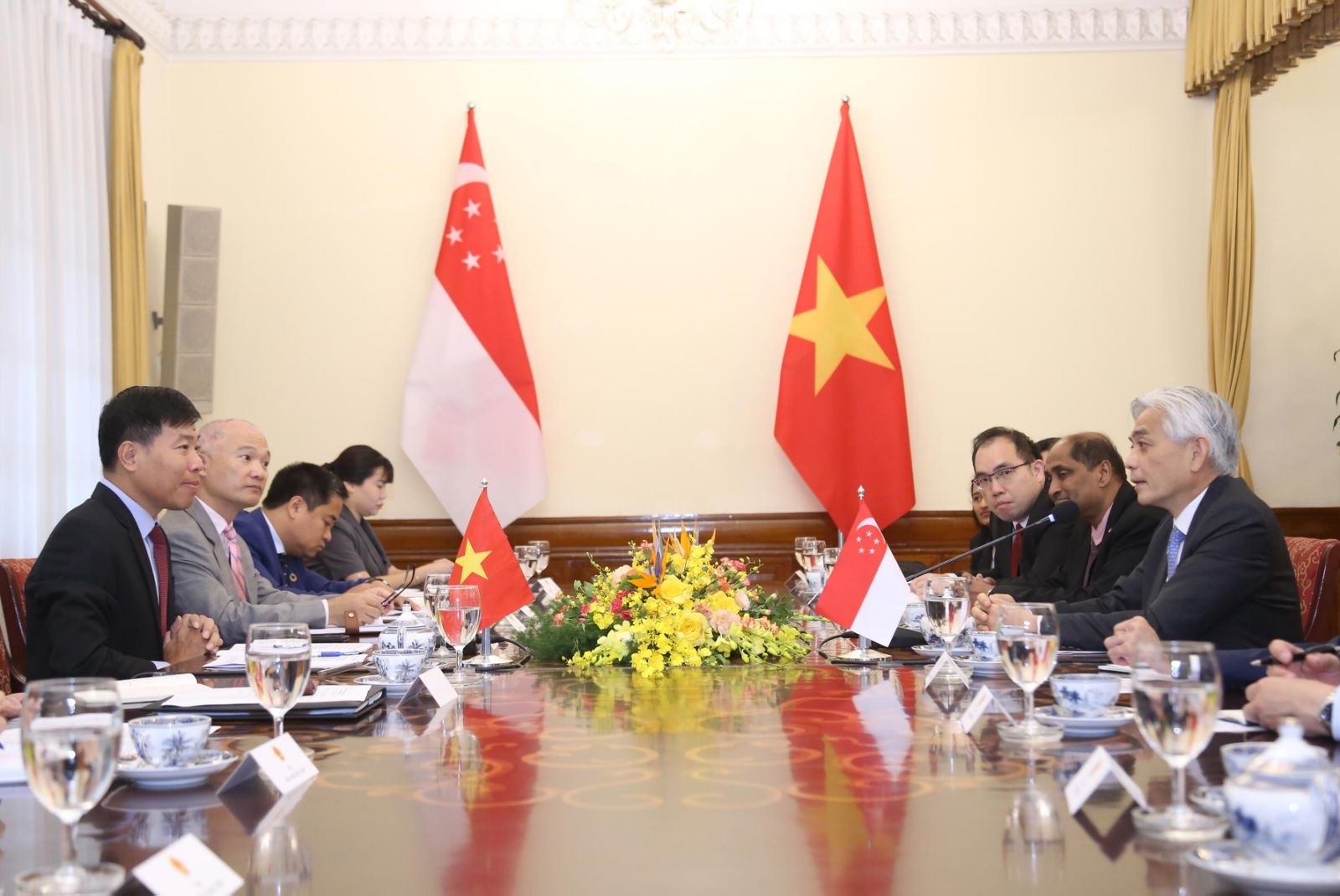Vietnam, Singapore convene 17th political consultation

Hanoi, August 27 (VNA) – Deputy Foreign Minister Nguyen Manh Cuong and Permanent Secretary of the Ministry of Foreign Affairs of Singapore Albert Chua co-chaired the 17th Vietnam–Singapore Political Consultation in Hanoi on August 26.
During the event, Cuong underlined the significance of the consultation mechanism, noting that this year’s meeting came as the two countries celebrate major anniversaries - Singapore’s 60th National Day, and Vietnam’s 80th August Revolution and National Day (September 2).
The two sides reviewed progress in bilateral cooperation and discussed ways to implement agreements in key areas reached by the two countries' senior leaders, especially following the upgrade of the bilateral ties to a Comprehensive Strategic Partnership during the historic visit of Party General Secretary To Lam and his spouse to Singapore in March.
Both sides expressed their delight at the positive developments under this new framework. Trade turnover reached 5.9 billion USD in the first half of 2025, up 17.5% year on year. Singapore’s investment in Vietnam rose nearly fivefold over the past decade, totalling 86.5 billion USD with 4,160 projects, ranking first among ASEAN countries and second globally. The network of 20 Vietnam–Singapore Industrial Parks (VSIPs) across Vietnam's 13 provinces has played an important role in this success. Cooperation has also expanded in defence, security, education, culture, and people-to-people exchanges, helping deepen mutual understanding.
The officials agreed to finalise soon an Action Programme to implement the Comprehensive Strategic Partnership. They pledged to boost collaboration in emerging areas such as science and technology, innovation, carbon credits, and clean energy connectivity, contributing to both countries’ carbon neutrality targets by 2050 and the ASEAN Power Grid initiative.
Cuong applauded Singapore’s continued expansion and upgrade of second-generation VSIPs (VSIP 2.0), and proposed bringing this successful model to the Mekong sub-region to generate new growth momentum.
Chua suggested stronger cooperation in food security, combating transnational crime, including cybercrime, and closer ties between armed forces, including navies. He reaffirmed Singapore’s readiness to share its experience with Vietnam and other Mekong countries in human resources training, digital transformation, smart cities, and logistics development.
On regional and international issues, the two sides stressed the importance of multilateralism, equality, and balanced interests among nations as prerequisites for peace and stability.
Cuong expressed his hope that Singapore will continue to show its strong commitment and take the lead in promoting respect for and adherence to international law, especially the 1982 UN Convention on the Law of the Sea (UNCLOS). Both sides reiterated their commitment to working with ASEAN partners to build the East Sea into a sea of peace, cooperation and development, and to fully and effectively implement the Declaration on the Conduct of Parties in the East Sea (DOC), contributing to creating a favourable environment for the negotiation of an effective and substantive Code of Conduct in the East Sea (COC). They also agreed to continue supporting each other's candidacy at multilateral mechanisms, especially at the United Nations.
Both sides agreed to hold the 18th round in Singapore in 2026.
Also the same day, Deputy Prime Minister and Minister of Foreign Affairs Bui Thanh Son received the Singaporean official, during which he highly valued the strong development of Vietnam-Singapore relations since the upgrade the bilateral ties to a Comprehensive Strategic Partnership, especially in economics and new areas, such as science and technology, and clean energy connectivity.
He also praised the effectiveness of the political consultation mechanism, suggesting that the two sides continue to promote this mechanism in reviewing and proposing directions for cooperation between the two ministries of foreign affairs, as well as discussing regional and international issues of mutual concern; and strengthening cooperation between the functional units of the two ministries.
Son suggested that Singapore continue to expand and upgrade the VSIP 2.0, prioritising technology transfer, low carbon emissions and innovation; and soon bring this successful model to the Mekong sub-region, contributing to narrowing the development gap.
He also proposed that the two sides continue to closely coordinate in the fields of wind power export, carbon credit exchange, seaport development and transnational crime prevention and control.
The Singaporean guest pledged to coordinate to effectively implement the results achieved during the visits of the two countries' senior leaders.
Affirming that Vietnam is an important partner of Singapore in the region, Chua said that he will continue to support human resources training for Vietnam and ASEAN member countries, including Timor-Leste.
He said he fully agreed with Son’s proposal on enhancing bilateral cooperation to stabilise food security, prevent crime, especially cybercrime; expand connectivity, including aviation connectivity and enhance people-to-people exchanges.
Chua also supported Vietnam and Singapore to continue to closely coordinate to maintain solidarity and the central role of ASEAN, and agreed to increase consultations and exchanges at regional and international forums, as well as promote cooperation between units of the two ministries of foreign affairs.
On this occasion, Deputy Foreign Minister Dang Hoang Giang, who is also head of Vietnam's ASEAN Senior Officials' Meeting (SOM), received Chua, who is also head of Singapore's ASEAN SOM. The two sides agreed that Vietnam and Singapore share many strategic interests, common views and concerns in ASEAN, saying they are the foundation for the two countries to cooperate closely in the group since Vietnam joined in 1995.
The two sides pledged to continue to coordinate to improve the effectiveness of ASEAN mechanisms, continue to build a developed and self-reliant ASEAN, maintain its central role in the region and make more contributions to solving regional and global issues, especially in the coming time when Singapore is the ASEAN Chair in 2027, Vietnam is the host of APEC 2027 and then the ASEAN Chair in 2029./.





